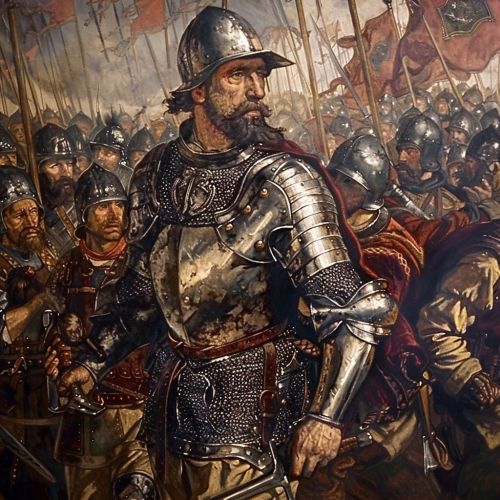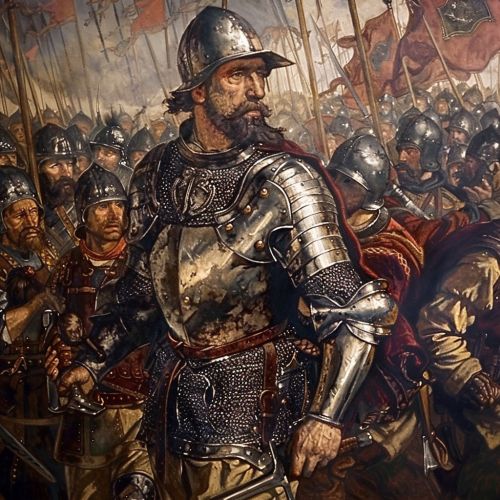Henry the Pious: Difference between revisions
(Created page with "== Early Life and Background == Henry the Pious, also known as Henry II of Silesia, was born on March 6, 1196, into the noble House of Piast. He was the son of Henry the Bearded and Hedwig of Andechs. His birthplace was the Duchy of Silesia, a region that played a significant role in the medieval history of Poland. Henry's early life was marked by a rigorous education, which included training in the arts of war and governance, as was customary for nobility of his era. =...") |
No edit summary |
||
| Line 11: | Line 11: | ||
Henry the Pious is perhaps best known for his military campaigns, particularly his involvement in the [[Battle of Legnica|Battle of Legnica]] in 1241. This battle was a significant event during the Mongol invasion of Europe. Henry led a coalition of European forces against the Mongol army, demonstrating his strategic acumen and bravery. Despite his efforts, the battle ended in a defeat for the European forces, and Henry was killed in action. His death marked a turning point in the Mongol invasion and had lasting implications for the region. | Henry the Pious is perhaps best known for his military campaigns, particularly his involvement in the [[Battle of Legnica|Battle of Legnica]] in 1241. This battle was a significant event during the Mongol invasion of Europe. Henry led a coalition of European forces against the Mongol army, demonstrating his strategic acumen and bravery. Despite his efforts, the battle ended in a defeat for the European forces, and Henry was killed in action. His death marked a turning point in the Mongol invasion and had lasting implications for the region. | ||
[[Image:Detail-97033.jpg|thumb|center|Medieval depiction of Henry the Pious in battle armor, leading his troops into the Battle of Legnica.|class=only_on_mobile]] | |||
[[Image:Detail-97034.jpg|thumb|center|Medieval depiction of Henry the Pious in battle armor, leading his troops into the Battle of Legnica.|class=only_on_desktop]] | |||
== Religious Contributions == | == Religious Contributions == | ||
Latest revision as of 16:44, 17 July 2024
Early Life and Background
Henry the Pious, also known as Henry II of Silesia, was born on March 6, 1196, into the noble House of Piast. He was the son of Henry the Bearded and Hedwig of Andechs. His birthplace was the Duchy of Silesia, a region that played a significant role in the medieval history of Poland. Henry's early life was marked by a rigorous education, which included training in the arts of war and governance, as was customary for nobility of his era.
Ascension to Power
Henry the Pious ascended to power following the death of his father in 1238. He inherited a duchy that was both prosperous and strategically significant. His rule began during a period of relative stability, but he soon faced numerous challenges, including internal strife and external threats. Henry's ascension was marked by his commitment to maintaining the legacy of his father, which included the promotion of Christianity and the consolidation of his territories.
Reign and Governance
Henry's reign was characterized by his efforts to strengthen the administrative and military structures of his duchy. He implemented a series of reforms aimed at improving the efficiency of governance and the welfare of his subjects. One of his notable achievements was the codification of laws, which helped to standardize legal practices across his territories.
Military Campaigns
Henry the Pious is perhaps best known for his military campaigns, particularly his involvement in the Battle of Legnica in 1241. This battle was a significant event during the Mongol invasion of Europe. Henry led a coalition of European forces against the Mongol army, demonstrating his strategic acumen and bravery. Despite his efforts, the battle ended in a defeat for the European forces, and Henry was killed in action. His death marked a turning point in the Mongol invasion and had lasting implications for the region.


Religious Contributions
Henry the Pious was a devout Christian, and his reign saw significant religious activity. He was a patron of the Cistercian Order and supported the establishment of several monasteries and churches. His commitment to Christianity was also evident in his efforts to promote the faith among his subjects and to support the Roman Catholic Church in its endeavors.
Legacy and Impact
Henry the Pious left a lasting legacy in the history of Silesia and Poland. His efforts to consolidate his territories and promote Christianity had a profound impact on the region. Despite his untimely death, his legacy continued through his descendants and the institutions he supported. The House of Piast remained influential in the region for many years, and Henry's contributions to the legal and administrative frameworks of his duchy were long remembered.
